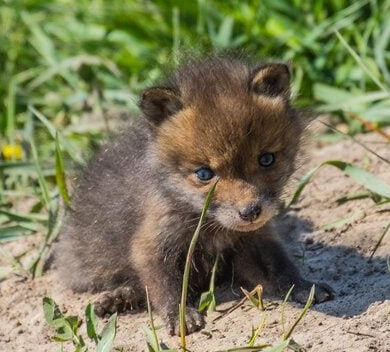
It was a dark and rainy night when my husband and I were driving back to my farm on a little hill in Iowa. The wipers couldn’t move fast enough to keep the windshield clear and we saw water rushing down the ditches beside the gravel road. Spring in the Midwest can be a dynamic time and the rain comes heavy and fast—unlike the gentle slow rains we’re accustomed to here in the Pacific Northwest.
The weather meant my husband was driving pretty slowly and that was a good thing because we both saw a tiny creature huddled on the road. He stopped the car as soon as he could. “Back up,” I said. “There’s a box in the backseat and I think we can help that little animal.”
I approached the baby quietly with gentle words and my hand outstretched palm up so as not to appear too threatening. The baby shivered and trembled, but it did not run away. I picked it up and it didn’t bite. It was so tiny.
At home, I set up an animal cage in the kitchen, made some mash with cat food and warm milk, and dried the baby with a towel. It was brown, with a pointy little face. It didn’t look like a kitten or a puppy, but I wasn’t really sure what kind of animal we had in the kitchen. Nonetheless, I decided to call the baby Bernie, because Bernie means “strong, brave bear.” This little one had already shown bravery in meeting calamity in life. And Bernie is one of those names that’s fitting for anybody—girl or boy.
The next morning the baby was dry and covered in mud, but I could tell that some of the mash was gone. I loaded the cage into the car and off we went to my farm vet, who worked with a wildlife rehabilitator who would know what to do. That’s when I learned that the baby was a boy fox weighing about seven ounces. He’d probably fled from the den when it flooded and somehow became separated from his family.
That morning, Bernie moved to live with other little orphans—possums and raccoons and skunks—at a wildlife refuge in the woods. I visited Bernie several times as he grew up, always talking quietly to him.
Eventually Bernie was allowed to explore the environment beyond his large pen. He’d go out for a few hours and then return. Later, still, Bernie had gained the ability and confidence to acquire his own food. He no longer returned to the refuge every day.
The next spring, I spotted a beautiful red fox resting atop one of the big round haybales that dotted the fields around my farm. I like to think that was Bernie coming back to thank me for saving him from the flood. He looked regal, well-fed, and content. The flood was scary and dangerous, but life had turned out well for a beautiful animal who showed courage and was able to adapt when he was separated from his birth family.
Carol Harker

